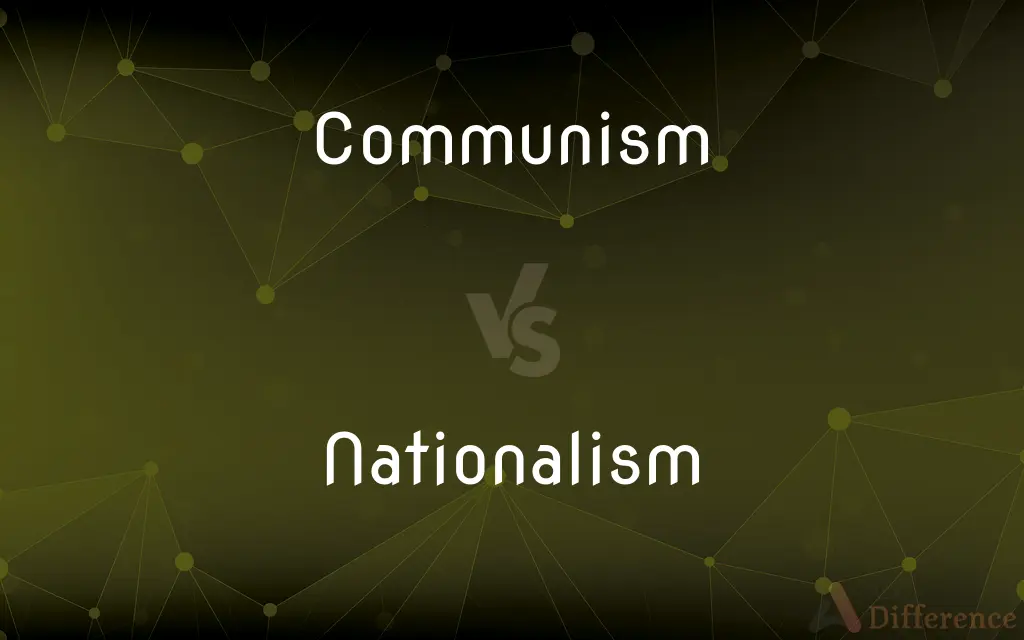Communism vs. Nationalism — What's the Difference?
By Urooj Arif & Fiza Rafique — Updated on March 25, 2024
Communism is an economic and political system advocating for classless, stateless society and communal ownership of resources, while nationalism emphasizes strong identification with one's nation and its interests, often placing it above others.

Difference Between Communism and Nationalism
Table of Contents
ADVERTISEMENT
Key Differences
Communism, rooted in Marxist theory, aims to create a society where property and resources are owned collectively, eliminating classes and state structures. In contrast, nationalism focuses on fostering a deep sense of pride and loyalty towards one's nation, potentially leading to the prioritization of national interests over international cooperation or global considerations.
While communism envisions a global community without borders, advocating for the unity of the working class across nations, nationalism often reinforces borders, emphasizing sovereignty and distinct national identities. This distinction highlights the globalist perspective of communism versus the particularist stance of nationalism.
Communism seeks to redistribute wealth and power to achieve equality among people, advocating for the dismantling of capitalist systems. Nationalism, on the other hand, does not inherently prescribe a specific economic system but can be allied with various political ideologies, from democracy to authoritarianism, depending on the cultural and historical context of the nation.
The goals of communism include abolishing private ownership to prevent exploitation and inequality, aiming for a society where goods and services are shared according to individuals' needs. Nationalism, however, may support private ownership and a range of economic policies as long as they serve the national interest, which can vary widely from economic protectionism to liberal capitalism.
Communist movements often encourage international solidarity among workers and oppressed classes, transcending national boundaries. Nationalist movements, however, tend to focus on uniting people within a country, sometimes at the expense of excluding or marginalizing others based on national, ethnic, or racial differences.
ADVERTISEMENT
Comparison Chart
Core Principle
Classless, stateless society; communal ownership
Strong identification with one's nation
Economic System
Abolition of private property
Can coexist with various economic systems
Political Goal
Global community without borders
Sovereignty and national interests
Social Structure
Equality among all individuals
Unity based on national, ethnic, or cultural identity
International Outlook
International solidarity
Focus on national sovereignty and interests
Compare with Definitions
Communism
Seeks global solidarity among the working class.
Communist parties worldwide express solidarity with workers across national borders.
Nationalism
A political ideology that emphasizes loyalty and devotion to one's nation.
Nationalism was a driving force behind the unification of Italy in the 19th century.
Communism
Advocates for the abolition of the state to achieve true equality.
In communism, the state is seen as an instrument of class oppression that must be dismantled.
Nationalism
Stresses the importance of a common national identity.
National symbols and holidays are celebrated to foster a sense of unity.
Communism
Opposes capitalist systems and private property.
Communism views capitalism as inherently exploitative and works towards its overthrow.
Nationalism
Often involves the belief that one's nation is superior to others.
Extreme forms of nationalism can lead to xenophobia and intolerance.
Communism
A political and economic ideology aiming for a classless society through collective ownership.
The Soviet Union aimed to achieve communism by abolishing private ownership.
Nationalism
Can be linked to the pursuit of sovereignty and independence.
Nationalism fueled movements for independence in colonial territories.
Communism
Emphasizes the distribution of goods based on need.
Communism argues that society should distribute resources from each according to his ability, to each according to his needs.
Nationalism
May advocate for policies that prioritize the nation's interests.
Nationalist governments often implement protectionist trade policies to shield domestic industries.
Communism
Communism (from Latin communis, 'common, universal') is a philosophical, social, political, and economic ideology and movement whose ultimate goal is the establishment of a communist society, namely a socioeconomic order structured upon the ideas of common ownership of the means of production and the absence of social classes, money, and, in some cases, the state. As such, communism is a specific form of socialism.
Nationalism
Nationalism is an idea and movement that holds that the nation should be congruent with the state. As a movement, nationalism tends to promote the interests of a particular nation (as in a group of people), especially with the aim of gaining and maintaining the nation's sovereignty (self-governance) over its homeland.
Communism
A theoretical economic system characterized by the collective ownership of property and by the organization of labor for the common advantage of all members.
Nationalism
Identification with one's own nation and support for its interests, especially to the exclusion or detriment of the interests of other nations
Their nationalism is tempered by a desire to join the European Union
Communism
A system of government in which the state plans and controls the economy and a single, often authoritarian party holds power, claiming to make progress toward a higher social order in which all goods are equally shared by the people.
Nationalism
Devotion, especially excessive or undiscriminating devotion, to the interests or culture of a particular nation-state.
Communism
The Marxist-Leninist doctrine advocating revolution to overthrow the capitalist system and establish a dictatorship of the proletariat that will eventually evolve into a perfectly egalitarian and communal society.
Nationalism
The belief that nations will benefit from acting independently rather than collectively, emphasizing national rather than international goals.
Communism
Any far-left political ideology or philosophy advocating holding the production of resources collectively, especially by seizing it through revolution.
Nationalism
The belief that a particular cultural or ethnic group constitutes a distinct people deserving of political self-determination.
Communism
Any political social system that implements a communist political philosophy.
Nationalism
Patriotism; the idea of supporting one's country, people or culture.
Communism
The international socialist society where classes, money, and the state no longer exist.
Nationalism
Support for the creation of a sovereign nation (which does not currently exist).
Basque nationalism
Kurdish nationalism
Communism
A scheme of equalizing the social conditions of life; specifically, a scheme which contemplates the abolition of inequalities in the possession of property, as by distributing all wealth equally to all, or by holding all wealth in common for the equal use and advantage of all.
Nationalism
Support for the union of Northern Ireland and the Republic of Ireland.
Communism
A form of socialism that abolishes private ownership
Nationalism
The state of being national; national attachment; nationality.
Communism
A political theory favoring collectivism in a classless society
Nationalism
An idiom, trait, or character peculiar to any nation.
Nationalism
National independence; the principles of the Nationalists.
Nationalism
A devotion to one's country; patriotism;
Nationalism
The policy of advocating the independence of one's country.
Nationalism
The policy of advocating the interests of one's own country exclusively, regardless of effects of a country's actions on other countries.
Nationalism
Love of country and willingness to sacrifice for it
Nationalism
The doctrine that several different cultures (rather than one national culture) can co-exist peacefully and equitably in a single country
Nationalism
The aspiration for national independence felt by people under foreign domination
Nationalism
The doctrine that nations should act independently (rather than collectively) to attain their goals
Common Curiosities
Can communism and nationalism coexist?
While theoretically at odds due to their differing goals and perspectives, there have been instances where nationalist movements adopted communist ideologies to achieve specific national objectives.
How does nationalism differ from patriotism?
Nationalism often implies a sense of superiority and aggressive loyalty to one's country, while patriotism is a deep love for one's country without the need to devalue others.
What role does state play in communism and nationalism?
Communism ultimately seeks the abolition of the state as a tool of class oppression, whereas nationalism emphasizes the importance of a strong state to protect and promote national interests.
How do communism and nationalism approach economic policies?
Communism advocates for the elimination of private property and capitalism, promoting an economy based on communal ownership. Nationalism does not prescribe a specific economic system but supports whatever policies are believed to further national interests.
What is a communist society supposed to look like?
A society where there is no class division, state apparatus, or private ownership, with resources distributed based on need.
What are the criticisms of communism?
Criticisms include its impracticality, tendency towards authoritarianism in practice, and failure to account for human nature and economic incentives.
Why do nationalist movements arise?
They can arise from desires for self-determination, reaction to oppression or colonial rule, cultural revival, or perceived threats to national identity.
What is the main goal of communism?
To establish a classless, stateless society with communal ownership of resources.
Is nationalism inherently bad?
Not necessarily; it can promote unity and pride within a nation, but when taken to extremes, it can lead to exclusion, intolerance, and conflict.
How do communism and nationalism impact democracy?
Communism's theoretical end goal contrasts with the concept of a democratic state, while nationalism can support or undermine democracy, depending on whether it promotes inclusivity and respects democratic principles or leads to authoritarianism.
Can nationalism lead to conflict?
Yes, extreme nationalism can result in xenophobia, ethnic or national superiority, and conflicts with other nations.
Do all communists reject nationalism?
While communism is inherently internationalist, some communist movements have incorporated nationalist elements to garner support or achieve specific goals within national contexts.
What are the benefits of nationalism?
Benefits can include fostering a sense of unity, preserving cultural heritage, and motivating citizens towards common goals.
How has communism been implemented historically?
Historically, communist principles have been implemented in various ways, often involving revolutionary changes and state control over the economy and society, with varying degrees of success and failure.
How do communism and nationalism view international relations?
Communism promotes international worker solidarity and cooperation across borders, while nationalism prioritizes national interests, which can sometimes lead to isolationism or competitive relations with other nations.
Share Your Discovery

Previous Comparison
Would vs. Should
Next Comparison
Minicomputer vs. MicrocomputerAuthor Spotlight
Written by
Urooj ArifUrooj is a skilled content writer at Ask Difference, known for her exceptional ability to simplify complex topics into engaging and informative content. With a passion for research and a flair for clear, concise writing, she consistently delivers articles that resonate with our diverse audience.
Co-written by
Fiza RafiqueFiza Rafique is a skilled content writer at AskDifference.com, where she meticulously refines and enhances written pieces. Drawing from her vast editorial expertise, Fiza ensures clarity, accuracy, and precision in every article. Passionate about language, she continually seeks to elevate the quality of content for readers worldwide.
















































